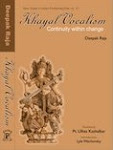Bihagda is a rare raga of the Bihag family. It is a raga of considerable antiquity, described in several mediaeval texts, and bears a close resemblance to raga Behag/ Byag of the Carnatic (South Indian) tradition. Bihagda is known to have been performed, in recent years, only by vocalists of the Jaipur-Atrauli and Agra gharanas. It is, however, identified more closely with the Jaipur-Atrauli gharana, with its commonly recognized form corresponding to the raga as performed by Jaipur-Atrauli vocalists.
Multiplicity of nomenclature is unusual in rare ragas. Diversity of treatment under the same name is more frequently encountered. Bihagda seems to be an exception to this general pattern. It has come to be known by another name – Khokar or Khokhar. Currently, and in the present context, both names refer to melodic entities performed by Jaipur-Atruali vocalists.
In popular misconception, Bihagda has come to be identified with the bandish “Pyari pag haule”, while Khokar is identified with a different bandish “Aaj ananda mukhachandra”. This distinction remains unsupported either by logic or by evidence. A melodic analysis of Jaipur-Atrauli’s so-called Khokar confirms its identity with Bihagda. There exists a recording of Kesarbai’s with the so-called Khokar bandish (Aaj anada mukhachandra), which she announces as Bihagda. Dhondutai Kulkarni, who has studied with five Jaipur-Atrauli maestros, confirms that both the bandishes cited above have been taught to her in Bihagda.
The available documentation of Khokar/ Khokhar (Subbaro, B. Raga Nidhi, Vol. III, 4th impression, 1996, Music Academy, Madras), probably from a different gharana, bears no resemblance whatsoever to either Bihagda or the so-called Khokar performed by Jaipur-Atrauli vocalists. The Khokar nomenclature for a Bihagda clone in the Jaipur-Atrauli gharana is, therefore, mysterious, and pregnant with avoidable confusion.
Subbarao (Ibid.1996), describes two types of Bihagda.
Type 1: S G M P N D S/ N D P M G R S
Type 2: S G M P N D S/ S N P – G M P D n D P -- M P G – RS
Type 1 listed by Subbarao, was recorded by Mallikarjun Mansur (EMI/HMV:STC:851004), and has been performed by Alka Dev, a disciple of Madhusudan Kanetkar of Jaipur-Atrali gharana (Concert in Ahmedabad, December 3, 1994, unpublished). This variant poses a sharper problem of differentiation of Bihagda from Bihag. This may be the reason why this version is even rarer than the common twin-Ni version (Type 2 above).
Type 2 listed above, which deploys komal (flat) Ni in the descent, is the most commonly encountered raga form. The pakad (identifying phrasing) of this variant is: GM/ PDnDP/ GMG or PMPG. Authorities have identified Ma and Sa as the vadi-samvadi (dominant and sub-dominant) swaras of the raga, though only hesitantly and on the grounds of differentiation between Bihag and Bihagda. In practice, however, Bihagda appears to revolve around the same Ga-Ni axis, as Bihag does, too.
Bhatkhande (Bhatkhande Sangeet Shastra, Vol. I, 5th Edition, 1991, Sangeet Karyalaya, Hathras) mentions a third variety of Bihagda which permits Re and Dh in the ascent, the former being used only in the higher octave, and the latter being used only in the middle octave. This variant has not been heard in recent times.
With reference to Bihag, Bihagda has some noteworthy features. Bihagda always uses Re subliminally in the descent as in Bihag. But, Dh, which is always subliminal in Bihag, is used subliminally as well as explicitly in Bihagda. Tivra Ma, used in the contemporary Bihag, is not used formally in Bihagda, although a touch of the swara has been observed in some recordings. When encountered, it is used in a racy movement, and never in the signatory Bihag fashion (P-M^-G-M-G).
Being a rare raga, Bihagda’s survival depends largely on the appeal and success of a handful of bandish-es. The defining paradigm of Bihagda, and its crucial discrimination from Bihag, is possible by a survey of recent recordings. For the analysis of the chalan (skeletal phraseology) of the raga as detailed below, I have relied only on available recordings featuring the common twin-Ni version, as performed by Jaipur-Atrauli vocalists.
Chalan:
N S G/ G M/ G M G P/ G M P D n D P or G M n D P/ G M P N S’ or G M P S’/ N S’ N DP/ P D N P D M P G/ G M n D P/ P M P G/ G RS
The recordings are: Kesarbai Kerkar (Pyari pag haule), Kesarbai Kerkar (Aaj ananda mukhachandra), both unpublished, Mallikarjun Mansur (HMV/EMI: STCS: 850730), and Dhondutai Kulkarni’s recording (India Archive Music, NY).
(c) India Archive Music Ltd. New York
The finest recordings of Raga Bihagda have been produced by India Archive Music Ltd., New York.








No comments:
Post a Comment